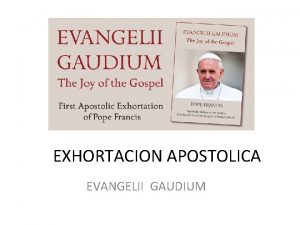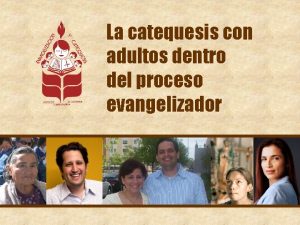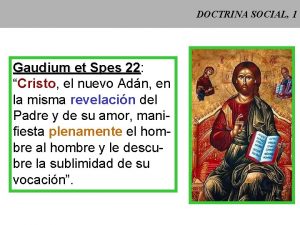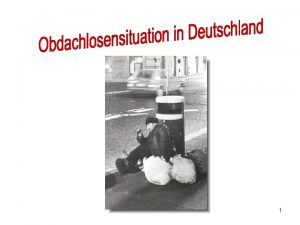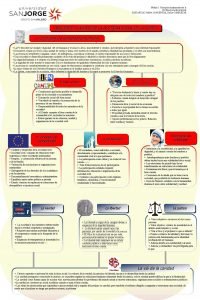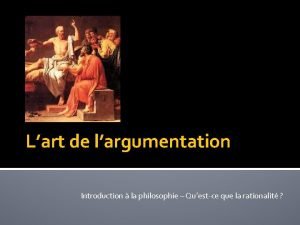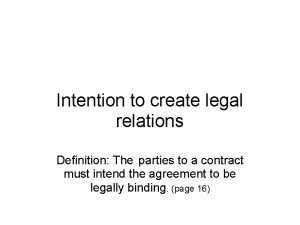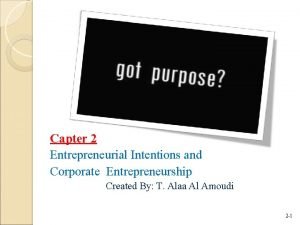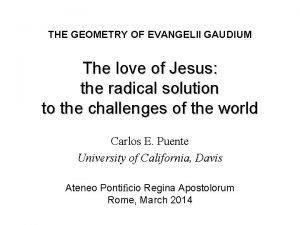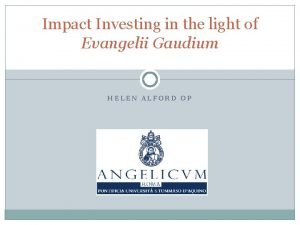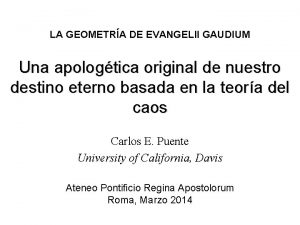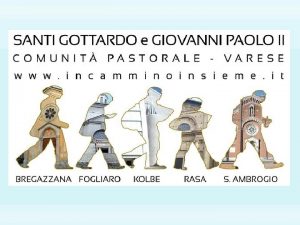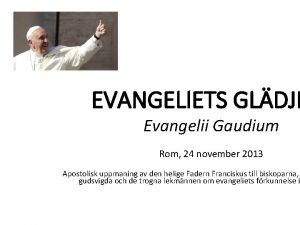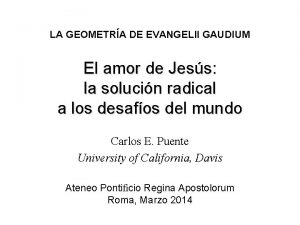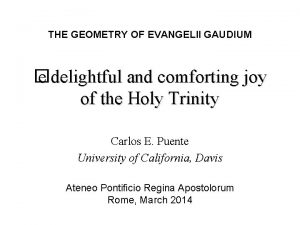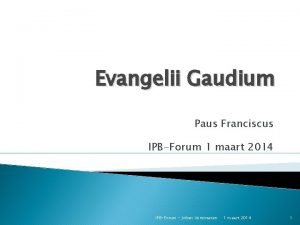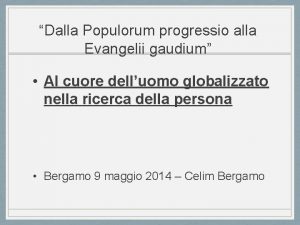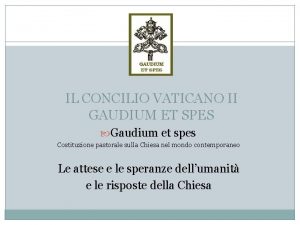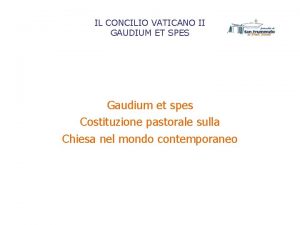Evangelii Gaudium Pope Francis 1 The intention of































- Slides: 31

Evangelii Gaudium Pope Francis

1. The intention of the document: “In this exhortation I wish to encourage the Christian faithful to embark upon a new chapter of evangelization marked by this joy, while pointing out new paths for the Church’s journey in years to come” (EG 1).

In order for this to be successful, the Pope invites “all Christians, everywhere, at this very moment, to a renewed personal encounter with Jesus Christ, or at least an openness to letting him encounter them; I ask all of you to do this unfailingly each day. No one should think that this invitation is not meant for him or her, since ‘no one is excluded from the joy brought by the Lord” (EG 3).

2. To whom are we sent to evangelize? -The faithful. -Those who are baptized, but “whose lives do not reflect the demands of baptism” (EG 14). -“Those who do not know Jesus Christ or who have always rejected him” (EG 14).

3. The Church is missionary by nature. We can no longer “‘passively and calmly wait in our church buildings’; we need to move ‘from a pastoral ministry of mere conservation to a decidedly missionary pastoral ministry’” (EG 15).

4. Each community must discern its particular path to evangelization. “All of us are called to take part in this new missionary ‘going forth. ’ Each Christian and every community must discern the path that the Lord points out, but all of us are asked to obey his call to go forth from our own comfort zone in order to reach all the ‘peripheries’ in need of the light of the Gospel (EG 20).

5. The Gospel is for all. “In fidelity to the example of the Master, it is vitally important for the Church today to go forth and preach the Gospel to all: to all places, on all occasions, without hesitation, reluctance, or fear. The joy of the Gospel is for all people: no one can be excluded” (EG 23).

Christians “should appear as people who wish to share their joy, who point to a horizon of beauty, and who invite others to a delicious banquet. It is not by proselytizing that the Church grows, but ‘by attraction. ’”

6. Evangelists must be involved in people’s lives. “Evangelizers thus take on the ‘smell of the sheep’ and the sheep are willing to hear their voice” (EG 24).

“The Church…travels the same journey as all mankind and shares the same earthly lot with the world: it is to be a leaven and, as it were, the soul of human society in its renewal by Christ and transformation into the family of God” (GS 40).

7. Keep the main things. see EG 34 & 35

8. The integral nature of evangelization. “To evangelize is to make the kingdom of God present in our world. Yet ‘any partial or fragmentary definition which attempts to render the reality of evangelization in all its richness, complexity, and dynamism does so only at the risk of impoverishing it and even distorting it” (EG 176).

9. The Gospel has social repercussions. “‘God, in Christ, redeems not only the individual person, but also the social relations existing between men’” (EG 178).

Because evangelization has social repercussions, “to the extent that he reigns within us, the life of society will be a setting for universal fraternity, justice, peace, and dignity. Both Christian preaching and life, then, are meant to have an impact on society” (EG 180).

“An authentic faith – which is never comfortable or completely personal – always involves a deep desire to change the world, to transmit values, to leave this earth somehow better than we found it” (EG 183).

“All Christians, their pastors included, are called to show concern for the building of a better world. This is essential, for the Church’s social thought is primarily positive: it offers proposals, it works for change, and in this sense it constantly points to the hope born of the loving heart of Jesus Christ” (EG 183).

10. The importance of outreach to the poor. “Each individual Christian and every community is called to be an instrument of God for the liberation and promotion of the poor, and for enabling them to be fully a part of society. This demands that we be docile and attentive to the cry of the poor and to come to their aid” (EG 187).

“The Church has realized that the need to heed this plea is itself born of the liberating action of grace within each of us” (EG 188).

“The Church, guided by the Gospel of mercy and by love for mankind, hears the cry for justice and intends to respond to it with all her might. In this context we can understand Jesus’ command to his disciples: ‘You yourselves give them something to eat!’ (Mk 6: 37): it means working to eliminate the structural causes of poverty and to promote the integral development of the poor, as well as small daily acts of solidarity in meeting the real needs which we encounter” (EG 188).

Solidarity… “a new mindset which thinks in terms of community and the priority of the life of all over the appropriation of goods by a few” (EG 189).

11. A Church which is poor and for the poor. “The Church has made an option for the poor which is understood as a ‘special form of primacy in the exercise of Christian charity, to which the whole tradition of the Church bears witness. ’ This option – as Benedict XVI has taught - ‘is implicit in our Christian faith in a God who became poor for us, so as to enrich us with his poverty. ’ This is why I want a Church which is poor and for the poor” (EG 198).

“Just as Christ carried out the work of redemption in poverty and persecution, so the Church is called to follow the same route that it might communicate the fruits of salvation to men. Christ Jesus, "though He was by nature God. . . emptied Himself, taking the nature of a slave", and "being rich, became poor" for our sakes. Thus, the Church, although it needs human resources to carry out its mission, is not set up to seek earthly glory, but to proclaim, even by its own example, humility and self-sacrifice. Christ was sent by the Father "to bring good news to the poor, to heal the contrite of heart", "to seek and to save what was lost". Similarly, the Church encompasses with love all who are afflicted with human suffering and in the poor and afflicted sees the image of its poor and suffering Founder. It does all it can to relieve their need and in them it strives to serve Christ. While Christ, holy, innocent and undefiled knew nothing of sin, but came to expiate only the sins of the people, the Church, embracing in its bosom sinners, at the same time holy and always in need of being purified, always follows the way of penance and renewal” (LG 8).

“Only on the basis of this real and sincere closeness can we properly accompany the poor on their path of liberation. Only this will ensure that ‘in every Christian community the poor feel at home. Would not this approach be the greatest and most effective presentation of the good news of the kingdom? ’ Without the preferential option for the poor, ‘the proclamation of the Gospel, which is itself the prime form of charity, risks being misunderstood or submerged by the ocean of words which daily engulfs us in today’s society of mass communication” (EG 199).

12. The primacy of the Church’s religious mission. “Since this Exhortation is addressed to members of the Catholic Church, I want to say, with regret, that the worst discrimination which the poor suffer is the lack of spiritual care. The great majority of the poor have a special openness to the faith; they need God and we must not fail to offer them his friendship, his blessing, his word, the celebration of the sacraments, and a journey of growth and maturity in the faith. Our preferential option for the poor must mainly translate into a privileged and preferential religious care” (EG 200).

13. The connection between poverty and the economy. “The dignity of each human person and the pursuit of the common good are concerns which ought to shape all economic policies” (EG 203).

“It is vital that government leaders and financial leaders take heed and broaden their horizons, working to ensure that all citizens have dignified work, education, and healthcare” (EG 205).

“I am firmly convinced that openness to the transcendent can bring about a new political and economic mindset which would help to break down the wall of separation between the economy and the common good of society” (EG 205).

14. Our position on the value of human life must be consistent. “Precisely because this involves the internal consistency of our message about the value of the human person, the Church cannot be expected to change her position on this question. I want to be completely honest in this regard. This is not something subject to alleged reforms or ‘modernizations. ’ It is not ‘progressive’ to try to resolve problems by eliminating a human life” (EG 214).

Therefore, while our commitment to the unborn is essential, “it is also true that we have done little to adequately accompany women in very difficult situations, where abortion appears as a quick solution to their profound anguish, especially when the life developing within them is the result of rape or a situation of extreme poverty” (EG 214).

“A human being is always sacred and inviolable, in any situation and at every stage of development” (EG 213).

“Spiritual conversion, the intensity of the love of God and neighbor, zeal for justice and peace, the Gospel meaning of the poor and of poverty, are required of everyone”…“I fear that these words…may give rise to commentary or discussion with no real practical effect” (EG 201).
 Pope francis evangelii gaudium quotes
Pope francis evangelii gaudium quotes Ideas principales de evangelii gaudium
Ideas principales de evangelii gaudium Evangelii gaudium papa francesco
Evangelii gaudium papa francesco Evangelii gaudium frases
Evangelii gaudium frases Pope francis global academy
Pope francis global academy Pope francis is catholic
Pope francis is catholic Pope francis motto
Pope francis motto Quotes about paschal mystery
Quotes about paschal mystery Pope francis
Pope francis Evangelii nuntiandi
Evangelii nuntiandi Evangelii nuntiandi reflection
Evangelii nuntiandi reflection Gaudiumetspes22
Gaudiumetspes22 Gaudium et spess art 3a
Gaudium et spess art 3a Apa pandangan gereja tentang dunia
Apa pandangan gereja tentang dunia Gaudium et spes literaturverzeichnis
Gaudium et spes literaturverzeichnis Gaudium es spes
Gaudium es spes Panggilan hidup berkeluarga
Panggilan hidup berkeluarga Mapa conceptual de la doctrina social de la iglesia
Mapa conceptual de la doctrina social de la iglesia Jelaskan makna hidup berkeluarga sebagai panggilan hidup!
Jelaskan makna hidup berkeluarga sebagai panggilan hidup! Miss attitude
Miss attitude Summarising learning intention
Summarising learning intention Creative intentions meaning
Creative intentions meaning Example learning intentions
Example learning intentions Verb viper
Verb viper Tissue repair
Tissue repair Direction of intention
Direction of intention La fausse analogie exemple
La fausse analogie exemple Essential tremor vs intention tremor usmle
Essential tremor vs intention tremor usmle Intention to create legal relations definition
Intention to create legal relations definition The intention to act entrepreneurially
The intention to act entrepreneurially Direction of intention prayer
Direction of intention prayer Intention to learn
Intention to learn


